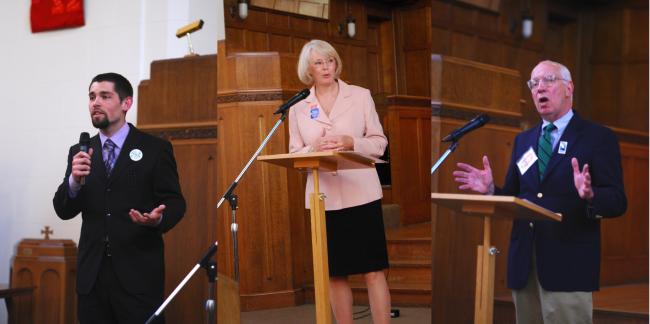City council candidates debate in Ballard (VIDEO)
City council candidates Dorsol Plants, Sally Bagshaw and David Bloom speak June 15 at Trinity United Methodist.
Tue, 06/16/2009
Three of the five candidates for Jan Drago's Seattle City Council seat introduced themselves to a handful of residents and answered their questions June 15 at Ballard's Trinity United Methodist Church.
David Bloom, Sally Bagshaw and Dorsol Plants attended. The other two candidates, Thomas Tobin and Brian Carver, were not invited because the church was not aware of them at the time, Pastor Rich Lang said.
Each candidate was given 15 minutes to introduce themselves to the audience. Lang said this format was important so that residents could get to know the candidates instead of hearing the same two-minute sound bite.
Sally Bagshaw, former chief of the civil division for the King County Prosecuting Attorney’s Office, talked about two people that changed her life.
One, a pastor, had given a sermon that made her think if she was fulfilling her life's purpose. The other was her former boss in the Prosecuting Attorney's Office, Norm Maleng.
Bagshaw said she is looking forward to serving the community.
"This isn't a chore for me," she said. "It's what brings me life."
David Bloom, a 30-year activist in Seattle and founder of the Interfaith Task Force on Homelessness, told the audience that Seattle has always been able to accomplish a lot, from funding schools and parks to passing low-income housing levies.
"There always seems to have been a spirit in this city that says we can do it," he said.
But, Bloom said he fears Seattle is losing the quality by spending too much money on large, unnecessary projects like a new jail or tax exemptions for market-rate housing.
"A few council members can make the difference between business as usual and effective change," he said.
Dorsal Plants, a former calvary scout in the U.S. Army and officer for the 34th District Democrats, made light of his unique name and relative youth compared to the other candidates.
A native of West Virginia, he said he fell in love with this city because he has not found another place in the world that answers the call to compassion and service as readily as Seattle.
Plants said the major problems in the city are homelessness, lack of government communication and increasing gang violence.
"We took money away from schools," he said. "We took money away from community centers. We took money away from libraries. And, we wonder why the youth turn to violence."
The candidates took questions from the audience and the moderators, Lang and University of Washington professor Dr. David Domke, about past mistakes, leadership qualities and engaging immigrant and minority populations.
In response to a question about funding for homeless shelters and the future of Nickelsville, Bloom said the community needs to make clear where they want public funds to go – large-scale projects or helping those in need.
He said he wants to make changes that would allow churches to host more tent cities and would try to find a permanent home for Nickelsville.
Bagshaw said it is not enough to simply build beds. She said she supports crisis diversion clinics as an alternative to sending those needing help to the hospital or jail.
There are many public buildings that are not being used that could serve as shelters, Plants said.
He said he would like to see the creation of a Web site, similar to Craigslist, where shelter workers could communicate with each other about what they need and what they have that others might need.
After a resident asked what Bloom had against the planned, viaduct-replacing tunnel, Plants said he supports it because it was the only plan that everyone could agree on.
Bagshaw said the tunnel will help create a usable, green waterfront, and stopping the project now would end up costing even more money.
"I want to move forward," she said. "We are now at a point where we can go back and go back and go back, or we can move forward."
Bloom said the public was cut out of the final decision on the viaduct replacement, and he is still not convinced that a majority of the public supports the tunnel.
The tunnel costs too much money for one project while neighborhood streets are falling apart, he said.
"I don't want to move forward if we are moving in the wrong direction," he said.
The election for Seattle City Council is this November, the primary election is August 18.


